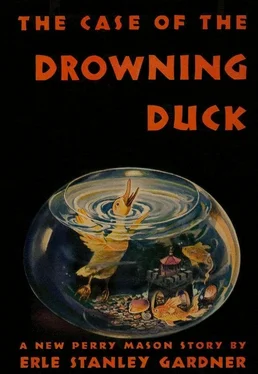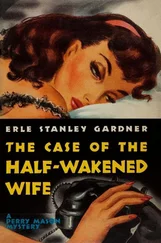“Uh huh. What’s the big idea?”
“I want to start ’em moving around,” Mason said. “If Adams was innocent, then someone else was guilty. The trail is pretty cold and pretty well covered up. But if we can throw a scare into the murderer and he starts trying to cover up the weak places in his back trail... well, we might catch him in the act.”
Drake’s chuckle came over the wire. “And Witherspoon thought you’d be confined to the record of that old case as shown in the transcript and newspaper clippings! What that bird has to learn about your methods!”
It was about four in the afternoon when Della Street entered Mason’s private office bearing a special-delivery letter.
Mason raised tired eyes from the transcript of The People versus Horace Legg Adams. “What is it, Della?”
“Special delivery. Looks suspicious. The address is printed, probably by someone using his left hand.”
Mason studied the envelope thoughtfully, held it to the light, grinned, said, “It’s just a newspaper clipping.” He picked up a thin-bladed stiletto which he used as a paper cutter, slit open the envelope, and shook out the newspaper clipping.
Della Street said, “I’m sorry I bothered you. I thought it was something important, and that you’d like to see the envelope before it was opened.”
“Wait a minute,” Mason said. “You had a hunch.”
She came to stand by the side of his chair. He held the clipping so they could both read at the same time. It was printed on a better grade of paper than the ordinary newsprint, quite evidently was not from a newspaper, and had been clipped from a chatty scandal column. It read:
What prominent desert socialite, who prides himself on his ancestry, is worried sick because he is about to fall heir to a family skeleton which is none of his choosing? The answer, of course, has to do with a headstrong daughter who has determined to move into a strange house without first opening all the closets. This skeleton bids fair to do some bone-rattling on a large scale. Our advice to Papa is to see if his prospective son-in-law is cruel to animals. If so, Papa had better do something about it before it’s too late. He might investigate the affair of the drowning duck. After all, young men who like to drown ducks just to show off to company aren’t apt to make good sons-in-law. Don’t say we didn’t tell you, Papa.
Mason studied the clipping thoughtfully, said to Della, “Run down the hallway to the Drake Detective Agency, and see if Paul Drake would know anything about what paper this came from.”
Della Street took the clipping, stood for a moment, turning it over in her fingers, said, “This is plain blackmail, isn’t it?”
“I don’t know,” Mason said.
She said suddenly, “Wait a minute. I know what paper this is.”
“What?”
“It’s a little Hollywood scandal sheet. I’ve seen some copies. There was some veiled stuff in there about some of the movie stars.”
“What is it, a newspaper?”
“No, not exactly. It’s handled as a quiz test. Whom does the shoe fit and can you put it on the right foot? Look over here on the reverse side of this clipping. You can see the way it’s handled.”
Della Street indicated a paragraph which read,
Some 240 of our subscribers put the right shoe on the right foot of the movie star to whom we referred in our last week’s column, the one who thought it would be a swell idea to give a marijuana party. It just goes to show how these things get around.
Mason jerked his head toward the telephone. “Give Paul’s office a ring. If he’s in, ask him if he can come down here for a second or two. I want to talk with him about this, and about Miss X.”
Della put through the call, said, “He’ll be here in just a moment,” hung up the receiver, and asked, “You think Miss X is the missing link?”
Mason pushed his hands down deep in his trousers pockets. “Of course, Della, I’m always suspicious of district attorneys.”
“And they’re always suspicious of you, eh?” she said.
Mason acknowledged the point by grinning. “Now, in this case,” he said, “the district attorney, according to the newspapers, reached an agreement with the defendant’s lawyer by which it was stipulated that the young woman whose name had been used by the defendant as the person with whom the murdered man was supposed to have run away could be referred to throughout the case as Miss X. That’s the biggest single blunder the lawyer who handled that case made.”
“Why?”
Mason said, “Because it was the same as a public admission on the part of the lawyer that he didn’t believe in his own client. Remember, Adams told the police Latwell had said he was going to run away with this Miss X. Then when they found Latwell’s body buried under the cellar floor in the factory, the police adopted the position that this must have been a lie. The stipulation entered into by Adams’ attorney indicates that he thought so, too. At least, it looked that way to the jury.”
Delia Street nodded slowly.
Mason said, “Now that’s one thing about the case I can’t understand. The logical move would have been for the district attorney to have introduced those initial statements in evidence, then called the woman mentioned in those statements and had her deny that she’d ever had any such conversation with Latwell.”
“Well,” Della Street asked, “why didn’t he?”
“For one thing, this stipulation made it unnecessary,” Mason said. “When Adams’ attorney stipulated that the woman could be kept out of the case and referred to only as Miss X, it made the jury think that both the district attorney and Adams’ lawyer knew he’d been lying. Now suppose he hadn’t been lying? Suppose Latwell actually had intended to run away with this girl? See what an interesting vista of possibilities that opens up?”
“But wouldn’t she have had to admit to the district attorney that...”
“There’s nothing to indicate she ever talked with the district attorney or that he ever talked with her,” Mason said. “She...”
Knuckles tapped a code signal on the door of Mason’s private office.
“That’s Drake,” Mason said. “Let him in.”
Paul Drake was carrying half a dozen telegrams as he entered the office. “Well, we’re gradually getting somewhere, Perry.”
Mason said, “Give me yours first, and then I’ll give you mine.”
“Milter isn’t at the Wiltmere Apartments. I’ll give you one guess as to where he is.”
Mason raised his eyebrows. “El Templo?”
“Right.”
“How long’s he been there?”
“Four or five days.”
“Where?”
“In an apartment house at eleven sixty-two Cinder Butte Avenue. It’s a frame two-story that was turned into an apartment house — on the order of a furnished flat. There are four in the building. You know the type. Two upstairs, two down, four private entrances.”
“Interesting,” Mason said.
“Isn’t it? Now I’ll tell you something else. A young woman by the name of Alberta Cromwell claims to be his wife. She followed him down to El Templo, found the apartment next to his vacant, and rented it.”
“He know she’s there?” Mason asked.
“I don’t see why not. Her name’s on the mailbox, Alberta Cromwell.”
“Why didn’t she go down with him?”
“Darned if I know.”
Mason handed the envelope and clipping across to Drake. “This came by special-delivery mail a few minutes ago.”
Drake started to read the clipping, then lowered it to say, “I haven’t given it all to you yet. The blonde in Allgood’s office sneaked down to a drugstore to put in a call from a telephone booth. My operative got in the booth next to her and could hear the conversation. Guess what?”
Читать дальше












